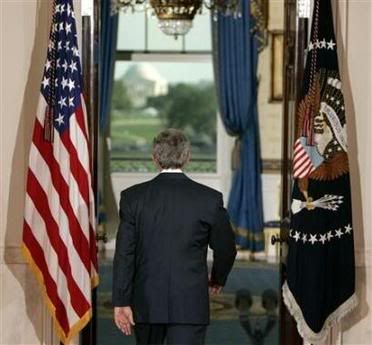Obama's Foreign Policy Challenge
 Eight years of George Bush has virtually destroyed America's clout as a diplomatic broker on the world stage, stretched the countries military might almost to the breaking point, thrown away her reputation as an honest member of the international community, and broken the back of the U.S. and the global economy, leaving the mess for a new president to clean up.
Eight years of George Bush has virtually destroyed America's clout as a diplomatic broker on the world stage, stretched the countries military might almost to the breaking point, thrown away her reputation as an honest member of the international community, and broken the back of the U.S. and the global economy, leaving the mess for a new president to clean up.
Can Barack Obama restore the heights of power of American imperialism? Should he even attempt to do so if he can or would that be counterproductive and merely postpone a day of reckoning, a day of a more realistic balance of powers in the world community?
Does Bush leave having set in motion an unstoppable series of events that when combined with the continuing collapse of the economy will finally lead to a multipolar world in which America is one country in an international community of power equals, at least diplomatically and economically?
After news of Barack Obama's electoral victory on Tuesday night, celebrations were seen worldwide and international leaders were falling over themselves to issue statements of approval.Power, or reputation?
Eric Margolis believes that that reaction is fueled by the view that the Bush administration has created a mess that the world hopes Obama can rectify.
In the first part of our interview, former GOP supporter Margolis explains why he is "elated" by Obama's victory and dismayed with his former party. Margolis outlines his belief that Obama's biggest challenge will not be in confronting non-state actors like Al Qaeda, but rather in deescalating the heightening tension with Russia which the Bush Administration has created with a series of recent provocations.
Secondly, he will have to put forward a consistent position on relations with China, something that Bush has yet to do despite China's meteoric rise in international influence during his tenure.
With respect to the economic crisis' impact on US foreign policy, Margolis offers that US power is projected to a greater extent through its dollar, as expressed through the strategic funding of allies within foreign countries, than through its military. As such, the US will have to acclimatize itself to a reduced level of influence in the world if the economy does not recover.
November 11, 2008 - about 10 minutes
Obama's foreign policy challenge
Eric Margolis: Bush admin has left Obama an international 'mess', with Russia at the top of the list
Eric Margolis is a journalist born in New York City and holding degrees from Georgetown the University of Geneva, and New York University. During the Vietnam War he served as a US Army infantryman.
Margolis is the author of War at the Top of the World –- The Struggle for Afghanistan and Asia is a syndicated columnist and broadcaster whose articles have appeared in The New York Times, The Wall Street Journal, The International Herald Tribune, Mainichi Shimbun and US Naval Institute Proceedings.
Margolis is an expert of military affairs, a former instructor in strategy and tactics in the US Army, and a member of the International Institute of Strategic Studies and the Institute of Regional Studies in Islamabad, Pakistan.
Eric Margolis' books have been published in the US, Canada, Britain, and India. He often appears and contributes to national and international news items for outlets such as CNN, ABC,CBC and Voice of America to the Wall Street Journal and Maninichi-Tokyo. He broadcasts regularly on foreign affairs for Canadian TV (TV Ontario and CBC), radio, and has appeared on ABC, CBS, CNN, and PBS
Which is more important? Or are they mutually exclusive?









